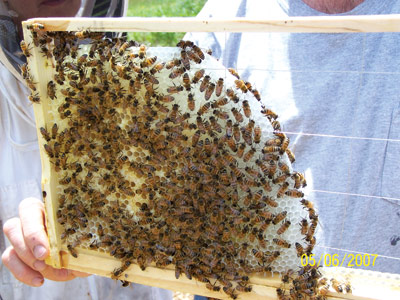They tell me he'll grow out of it, but I'm afraid some fears run blood-deep.
When I watch my little boy cover his head and screech in terror at the approach of this season's particularly zealous, dive-bombing bees, it's pure déjà vu. At 64, my otherwise-unflappable father still paws the air like a B-movie grizzly and hisses incongruously when a stinging insect enters his orbit.

And he's not even allergic to them.
People are funny when it comes to bees. Besides the garden-variety phobics and those unfortunates for whom encounters can truly be deadly, there are scores of ordinary folks who style themselves experts on the habits of barbed bugs. These naturalist wannabes dispense advice with a smugness implying an unequaled intimacy with nature. They're down with the bees, man — clueless city slickers need to wake up and smell the superiority.
Stranger at the garden store: "Tell your son not to worry. It's only a bumblebee, and bumblebees won't sting you. They're only interested in gathering nectar."
Stranger at the Botanical Gardens: "They're really swarming today, huh? But they're only carpenter bees, and carpenter bees won't sting you. They're only interested in boring into that piece of wood."
Stranger at the N.C. Arboretum: "That's just a little sweat bee, and sweat bees won't sting you." (Unless you're perspiring, presumably. But perhaps not even then.)
Strangers everywhere (with dismissive shrugs): "There's no need to be afraid of them. Bees won't bother you if you don't bother them."
I take particular exception to that last salvo. I was once sitting on my future husband's porch in Haywood County doing nothing whatsoever that could be construed as "bothering" — neither eating nor drinking nor moving a muscle, merely gazing at the back side of Cold Mountain — when a couple of hornets zeroed in on my mouth and stung the lollapalooza out of it. Perhaps they'd just gotten lost and irritable on their way back to indulge their beloved queen, wherever she may have been lurking. But you can't tell me those little sycophants didn't have it in for me.
Seeking the advice of a bona fide expert, I recently caught up with Jon Christie, who runs Wild Mountain Apiaries deep in Madison County. The business provides beekeeping supplies, instruction and related products and services (such as removing intact hives from private property).
His specialty is honeybees, whose dwindling numbers are a whole other story that's prompted a virtual cottage industry in Western North Carolina and beyond. But even this committed preserver of the species won't pretend that they don't sting. In fact, says Christie, honeybees "are the only ones with a barbed stinger which results in their death when they sting mammals. [But] they can sting each other and some animals without being disemboweled."
Refreshingly, Christie admits he "only knows a little about other types of bees." But once asked — this is key — he is happy to share what he's learned. Take, for instance, those fuzzy picture-book bees that so love to linger over a choice sprig of clover: "There are lots of bumblebee species," notes Christie. "And many do sting. But they're not easily provoked."
Sounds reasonable. Yellow jackets, however — the sinewy, aggressive ones that like to zigzag over an otherwise merry picnic — "have the numbers," he concedes. Pest-eaters rather than pollinators, they are nonetheless fatally attracted to anything sweet and sticky that comes in an aluminum can. A female yellow jacket can sting multiple times, and she rarely travels alone.
As for big, gnarly hornets and hovering clouds of wasps, their sting, says Christie, "hurts like hell."
Resolved: Cows moo. Hounds bay. Humans war. And bees sting — all kinds of them, for various reasons.
Now that that's out of the way, I'm ready to attend to the buzz of regional beekeeping and the crucial role these creatures play in the food chain. And I'd be happy to write the honeybees' story — from a respectful distance, of course. I won't bother them if they don't bother me.
[Melanie McGee Bianchi is a contributing editor at Carolina Home + Garden.



Before you comment
The comments section is here to provide a platform for civil dialogue on the issues we face together as a local community. Xpress is committed to offering this platform for all voices, but when the tone of the discussion gets nasty or strays off topic, we believe many people choose not to participate. Xpress editors are determined to moderate comments to ensure a constructive interchange is maintained. All comments judged not to be in keeping with the spirit of civil discourse will be removed and repeat violators will be banned. See here for our terms of service. Thank you for being part of this effort to promote respectful discussion.